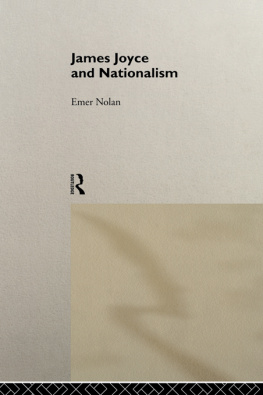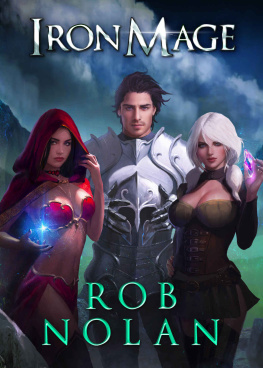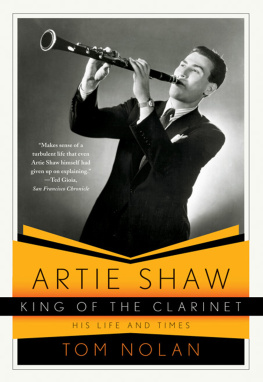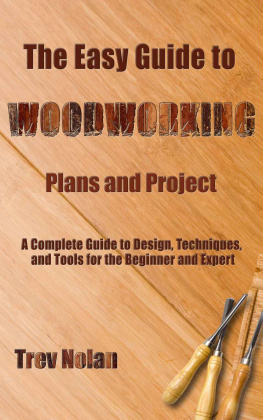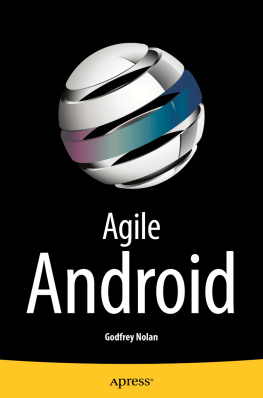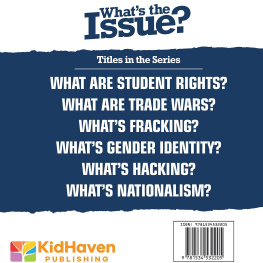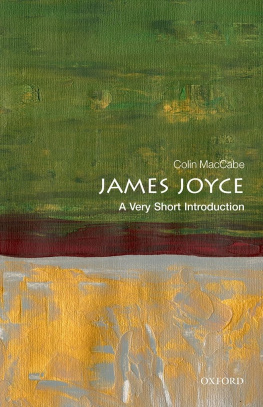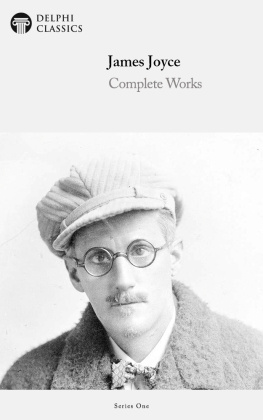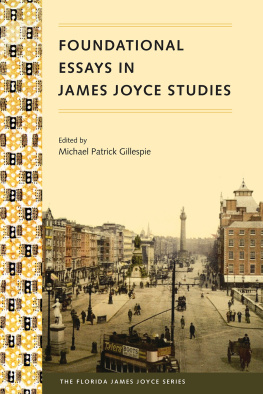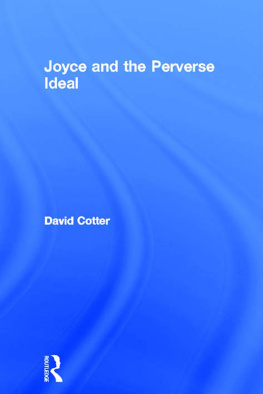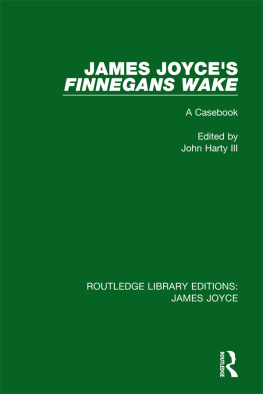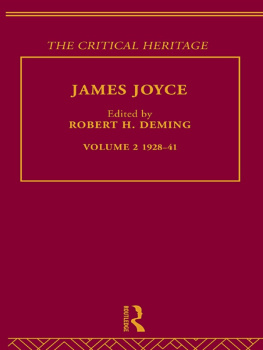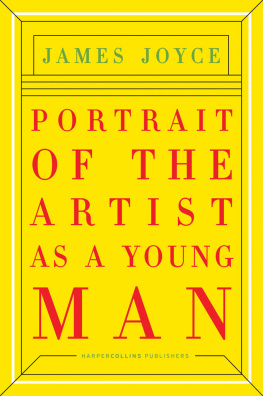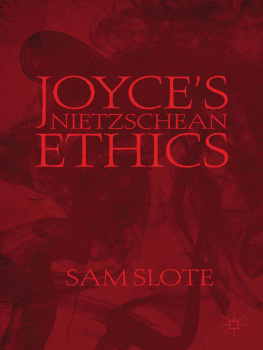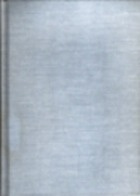Nolan - James Joyce and Nationalism
Here you can read online Nolan - James Joyce and Nationalism full text of the book (entire story) in english for free. Download pdf and epub, get meaning, cover and reviews about this ebook. year: 2017, publisher: TaylorFrancis, genre: Art. Description of the work, (preface) as well as reviews are available. Best literature library LitArk.com created for fans of good reading and offers a wide selection of genres:
Romance novel
Science fiction
Adventure
Detective
Science
History
Home and family
Prose
Art
Politics
Computer
Non-fiction
Religion
Business
Children
Humor
Choose a favorite category and find really read worthwhile books. Enjoy immersion in the world of imagination, feel the emotions of the characters or learn something new for yourself, make an fascinating discovery.
James Joyce and Nationalism: summary, description and annotation
We offer to read an annotation, description, summary or preface (depends on what the author of the book "James Joyce and Nationalism" wrote himself). If you haven't found the necessary information about the book — write in the comments, we will try to find it.
Nolan: author's other books
Who wrote James Joyce and Nationalism? Find out the surname, the name of the author of the book and a list of all author's works by series.
James Joyce and Nationalism — read online for free the complete book (whole text) full work
Below is the text of the book, divided by pages. System saving the place of the last page read, allows you to conveniently read the book "James Joyce and Nationalism" online for free, without having to search again every time where you left off. Put a bookmark, and you can go to the page where you finished reading at any time.
Font size:
Interval:
Bookmark:

JAMES JOYCE AND NATIONALISM
JAMES JOYCE AND
NATIONALISM
Emer Nolan

First published 1995
by Routledge
11 New Fetter Lane, London EC4P 4EE
This edition published in the Taylor & Francis e-Library, 2002.
Simultaneously published in the USA and Canada
by Routledge
29 West 35th Street, New York, NY 10001
1995 Emer Nolan
All rights reserved. No part of this book may be reprinted or reproduced or
utilized in any form or by any electronic, mechanical, or other means, now
known or hereafter invented, including photocopying and recording, or in
any information storage or retrieval system, without permission in writing
from the publishers.
British Library Cataloguing in Publication Data
A catalogue record for this book is available from the British Library
Library of Congress Cataloging in Publication Data
Nolan, Emer,
James Joyce and Nationalism/Emer Nolan.
p. cm.
Includes bibliographical references and index.
1. Joyce, James, 18821941Political and social views.
2. Politics and literatureIrelandHistory20th century.
3. NationalismIrelandHistory20th century.
4. Modernism (Literature)Ireland.
5. Nationalism in literature.
6. IrelandIn literature. I. Title.
PR6019.09Z755 1995
823.912dc20 948223
ISBN 0-203-21312-2 Master e-book ISBN
ISBN 0-203-21308-4 (Adobe eReader Format)
ISBN 0-415-10343-6 (Print Edition)
For
Eileen and Patrick Nolan
CONTENTS
ABBREVIATIONS
| CW | The Critical Writings of James Joyce, edited by Ellsworth Mason and Richard Ellmann (London: Faber & Faber, 1959). |
| D | Dubliners, the corrected text with an explanatory note by Robert Scholes (London: Jonathan Cape, 1967). |
| FW | Finnegans Wake, third edition (London: Faber & Faber, 1964). |
| P | A Portrait of the Artist as a Young Man, the definitive text, corrected from the Dublin Holograph by Chester G.Anderson and edited by Richard Ellmann (London: Jonathan Cape, 1968). |
| SH | Stephen Hero, edited with an Introduction by Theodore Spencer. Revised edition with additional material and Foreword by John J. Slocum and Herbert Cahoon (London: Jonathan Cape, 1956). |
| SL | Selected Letters of James Joyce, edited by Richard Ellmann (London: Faber & Faber, 1975). |
| U | Ulysses, the corrected text, edited by Hans Walter Gabler, et al. (London: Bodley Head, 1986). |
PREFACE
Few critics of James Joyce can have failed to remark on his ambivalence towards Ireland. Many of them view Joyces long, voluntary exile and dedication to aesthetic modernism as strangely at odds with his preoccupation with the world of his youth and his compulsive recreation of it in language. The notion of a creative tension between a metropolitan and a native Joyce has consistently been advanced to account for this apparent contradiction in his writings. None the less, critical constructions of the continuum of Joyces responses to Ireland, from affectionate tolerance to impassioned repudiation, are typically organized around the presumed certainty of his unsympathetic representation of Irish separatist nationalism. This characterizes virtually all accounts of Joyces politics to date, although such analyses have been produced in a wide range of critical vocabularies, and from a variety of theoretical and ideological perspectives.
It is perhaps unsurprising that Joyces most influential readers can disclose nothing but polar opposition between Joycean modernism and Irish nationalism. They maintain that his explorations of language, personal identity and history are simply incompatible with the reverence displayed for tradition and community in nationalist ideology. Nationalism, literary critics tend to suggest, in offering a narrow philosophy of racial identity and a mythologized, teleological model of history, can provide only a mirror-image of the imperialism which it may ostensibly oppose. Modernism, at least in the case of Joyce, in opening up writing to the energy and excitement of modernity, introduces a universe of innovation and democratic multiplicity: here, old absolutes and hierarchies are parodied and mocked; venerable, sacred languagesbe they of Church, family, historical precedent or nationlaid bare to what Joyce described as the sandblast (SL, p. 241) of his destructive stylism. The symbolic violence implied by this conception of writing ultimately yields to an essentially comic vision of the possibility of different languages and cultures peacefully co-exisiting; it has nothing in common with the violent exclusions enforced by nationalism. Thus Joyce is understood to depict an Ireland in which transnational modernity is still struggling to be born. Therefore, the idea of liberation which his work celebrates is unrelated to Irish culture, proceeding from the creative imagination of the emigr artist rather than from the inert realistic substratum of his writing. This received reading of Joyce can make little of the concerns of the marginal, colonized community as they are reflected in his texts, viewing them merely as the content of his experiments with literary form and language, lending colourful but essentially irrelevant local detail for humour or satire.
However, Joyces native country was not merely belated in respect to the rapidly changing Europe where he chose to spend most of his life. Rather, Ireland underwent an especially abrupt and disastrous accession to modernitytypically the experience of colonized societiesbetween the middle of the nineteenth century and the revolutionary period of 191622. In such conditions, modernization becomes explicitly associated with the culture of the colonial power. Any straightforward embrace or rejection of modernity is difficult for the colonized people, who very often seek to enjoy its benefits, but on their own terms. In early twentieth-century Ireland, a variety of cultural and political movements struggled with the difficulties and ironies of anti-colonial nationalism and decolonization. These have been caricatured to such an extent in Joyce criticism that no response other than one of implacable opposition seems plausible from him. For in metropolitan literary theory, nationalism itself is often confused with an attachment to tradition which is pre-modern or anti-modern, in spite of the declarations of historians and sociologists that The basic characteristic of the nation and everything connected with it is its modernity. More precisely, both modernism and nationalism might be defined by their ambivalence towards modernisation, sharing as they do a crucial interest in the issues of cultural change and regeneration, language and popular culture, the realm of the aesthetic and the role of the artist. Nationalism seeks to recreate a sense of traditional community within contemporary mass culture: modernist writing exploits the relentless energy of commercial civilization, but it may also record or lament the progressive abolition of local difference in the modern world. In these terms, Joycean modernism and Irish nationalism can be understood as significantly analogous discourses, and the common perception of them as unrelated and antagonistic begins to break down.
The modernity to which Joyce responds, then, is not transnational or universal, and the major trends in Joyce criticism have occluded the particularity of Irish historical experience as it determines and is reflected in his fiction. His commentators have instead insisted on both reading Ireland through Joyce and interpreting Joyce as Irishman. The former procedure grants the artist authority to comment on his native culture, while the latter constructs him as passively typical of itironically, a judgement itself based on evidence gathered from his own texts, and from what is presumed to be his own portrayal of national character. Each approach has involved critics in a stereotyping discourse about Ireland and the Irish: for many readers, Joyces work seems to participate in, and therefore legitimate, this kind of discussion. Such critical prejudice necessarily produces distortions, but these are not merely random errors, and they can be elucidated by reference to the historical conditions in which they first arise. Many of Joyces earliest and most enthusiastic supporters and promoters, for example, were committed to a purely cosmopolitan and internationalist view of modernism. The American liberal tradition in Joyce studies, which now dominates the international James Joyce critical industry, is founded on a belief in the writers pacifism and tolerant pluralism. Recent accounts of the texts influenced by post-structuralism and French feminist theory have argued that Joyces writing dismantles those traditional ideologies which render us sexed and civil subjects, among them nationalism. In all of these cases, the latter is considered chiefly in the context of European fascism: such accounts do not acknowledge that nationalisms vary, and are internally divided and disputatious.
Next pageFont size:
Interval:
Bookmark:
Similar books «James Joyce and Nationalism»
Look at similar books to James Joyce and Nationalism. We have selected literature similar in name and meaning in the hope of providing readers with more options to find new, interesting, not yet read works.
Discussion, reviews of the book James Joyce and Nationalism and just readers' own opinions. Leave your comments, write what you think about the work, its meaning or the main characters. Specify what exactly you liked and what you didn't like, and why you think so.

